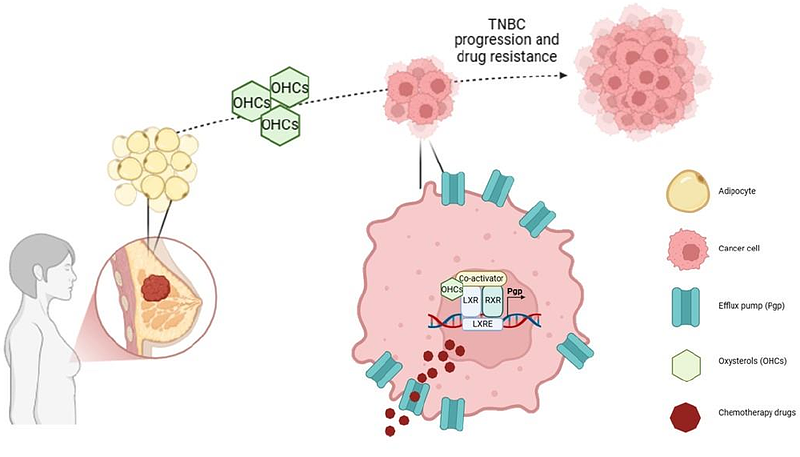Adipocytes in tumour microenvironment promote chemoresistance in TNBC through oxysterols

Adipocytes in tumour microenvironment promote chemoresistance in TNBC through oxysterols
Websdale, A.; Al-Hilali, Y.; Kim, B.; Williams, B. J.; Wastall, L.; Roberg-Larsen, H.; Hughes, T. A.; Cioccoloni, G.; Thorne, J. L.
AbstractObjectiveTriple-negative breast cancer (TNBC) patients with excess adipose tissue experience poorer disease-free survival than those with a healthy body mass index. Adipocytes, abundant in mammary tissue, store and release cholesterol, which can be hydroxylated to form oxysterols. These cholesterol derivatives activate the liver X receptor (LXR) pathway. This study tested the hypothesis that adipocytes contribute to an imbalanced tumour-microenvironment by exposing cancer cells to elevated oxysterols, mimicking chemotherapy-exposure conditions and priming for chemoresistance.\n\nMethodsTumour tissue microarray from 148 TNBC patients was assessed using immunohistochemistry for expression of CH25H, CYP46A1, CYP27A1 and P-glycoprotein, and survival outcomes assessed. Gene expression was compared between tumours from patients and mouse models with high versus low adiposity. In vitro, cells of the tumour-microenvironment were evaluated for oxysterol content, secretion, expression of relevant enzymes, and their ability to induce P-glycoprotein expression and drug resistance in TNBC cells.\n\nResultsIn patients, expression of oxysterol-synthesizing enzymes in stroma correlated with P-glycoprotein expression in cancer epithelial cells and was associated with shorter disease-free survival. Adipocytes conditioned media contained significantly higher oxysterols levels than that conditioned by other cell types and induced P-glycoprotein expression and drug resistance in MDA.MB.468 cells. Obese mice had elevated levels of P-glycoprotein in tumours compared to lean counterparts.\n\nConclusionsAdipocytes secrete oxysterols that promote drug resistance in vitro and correlate with oxysterol:Pgp axis and survival in vivo.\n\nSignificanceThis study reveals a mechanism by which adipose tissue contributes to drug resistance in ER-negative breast cancers, identifying the oxysterol-Pgp axis as potential therapeutic target.